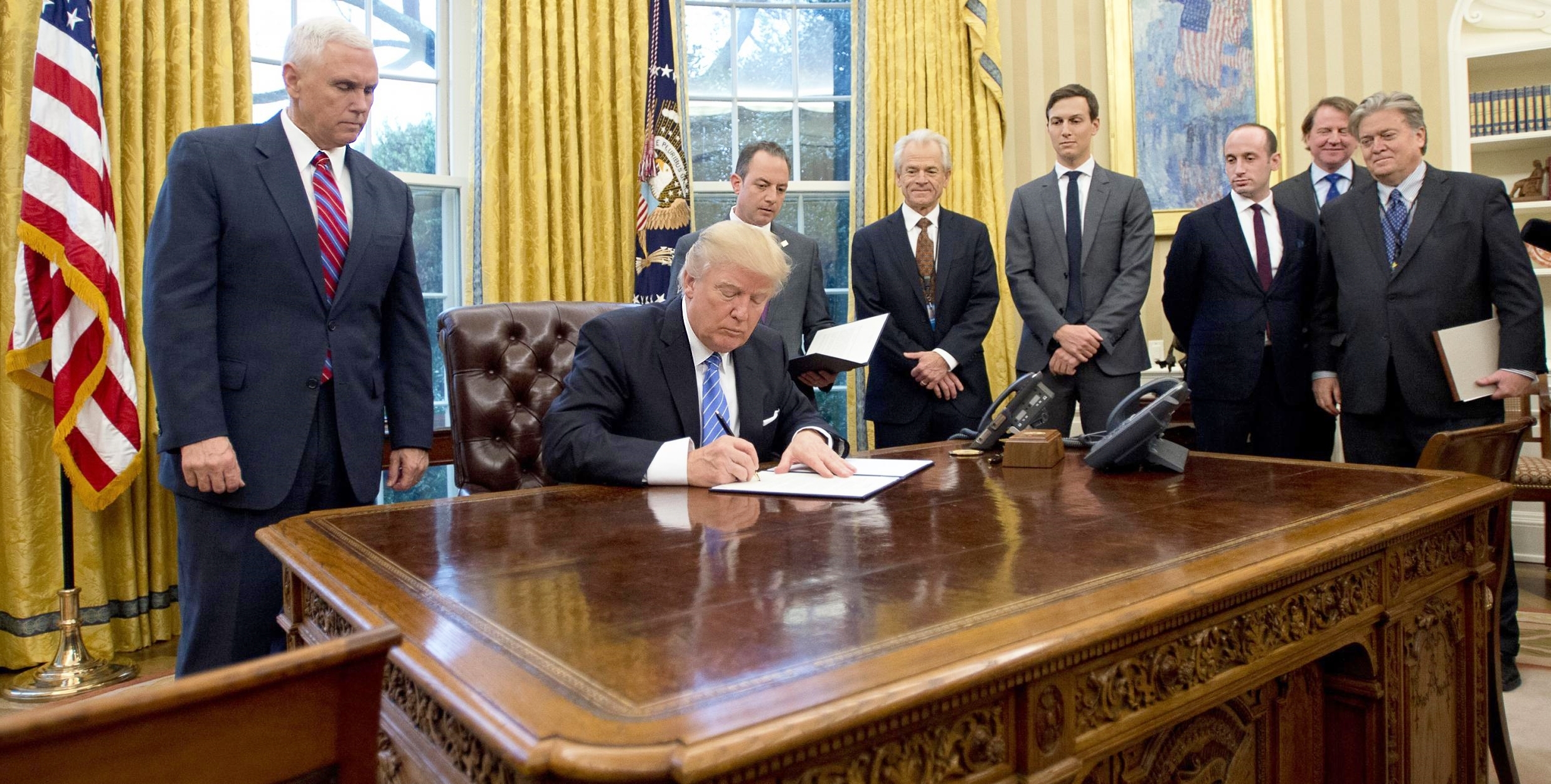 Trump signs an executive order to withdraw the United States from the TPP, January 23, 2017 (White House)
Trump signs an executive order to withdraw the United States from the TPP, January 23, 2017 (White House)
One of Trump’s first acts as President was to pull the United States out of the 12-country Trans-Pacific Partnership, which he called “a potential disaster” for America. Six months later he wants NAFTA to become the TPP that U.S. corporate lobbyists were dreaming of all along. The about-face will surely irritate his base, but it was predictable.
Republican criticism of the TPP was that it did not go far enough to protect U.S. corporate interests. Its intellectual property rights chapter did not force participating countries to extend their data exclusivity terms on biologic (non-chemical-based) drugs to the excessive U.S. norm of 12 years. Its e-commerce rules did not adequately enhance the opportunities of U.S. tech giants to profit from cross-border data flows, and left too much space for data-localization policies (meant to protect privacy of information) in Canada and elsewhere.
The USTR’s objectives for NAFTA renegotiation, released yesterday during “Made in America Week” at the White House, reflect these complaints, suggesting the Trump administration thinks it can get much more out of Mexico and Canada alone than around a table with nine additional countries.
The 18-page summary begins with market access for agricultural and non-agricultural exports, which Trump wants to see maintained or improved upon. On regulations affecting agricultural and food products, the proposals are straight from the TPP. One notable exception is a line about upgrading and strengthening NAFTA’s rules of origin (e.g., the 62.5% North American content requirement for duty-free trade in automotive products), and the means of certifying that companies are meeting them, but there are no details on precise changes sought.
The services proposals are also straight out of the TPP and Trade in Services Agreement, which Canada has agreed to in both venues. But there will be added pressure in the NAFTA renegotiation to open Canada’s telecoms, banking, fintech and insurance markets to more U.S. competition. And the U.S. will use the NAFTA renegotiation (as it did the TPP) to try to chip away at Canada Post’s express delivery services, which it claims (wrongly) to be unfairly subsidized.
Where some had wondered if Trump would remove NAFTA’s investor–state dispute settlement process, the USTR document suggests it may be tweaked at best, to make sure domestic and foreign firms have the same rights. But as Roosevelt Institute fellow Todd Tucker points out, “successive administrations have always maintained that ISDS never did give greater substantive rights. So no real change there.”
In a move designed to placate labour and environmental groups—the most outspoken critics of the NAFTA trade model in the U.S.—the USTR is proposing to throw out NAFTA’s labour and environment side agreements, and to incorporate chapters covering both areas into the agreement itself. This, too, is from the TPP—and was done in the Canada–EU Comprehensive Economic and Trade Agreement. International labour unions were dissatisfied with the results in both, which fell far short of providing a way to effectively punish violations of labour rights or defend ecosystems from commercial excess.
On procurement, the Canadian government (and provinces) will be disappointed the U.S. wants to maintain the ability of states and the federal government to “Buy American.” This was entirely predictable, but hypocritically the U.S. also wants increased access to Canadian and Mexican procurement markets, especially construction and infrastructure projects. As the CCPA suggests in its contribution to the government’s consultation on the NAFTA renegotiations, we’d be better off to propose a “Buy North American” strategy to Trump and the Mexican government, which would fit with Trump’s goals of enhancing the opportunities for NAFTA-made goods in all three countries.
Canada will also be worried by the USTR proposal to eliminate NAFTA’s Chapter 19 dispute settlement process, which provided a venue for Canada to resolve trade disputes outside of U.S. courts. This was a red line for Canada in the NAFTA negotiations and it will be here, too. But now Canada is being asked to fight for and, yet again, to pay for the dispute settlement mechanism. This means pressure to make unreasonable concessions to Trump in areas like supply management, data protection and other areas. In either case, we lose.
And that’s what’s really frustrating about this whole process. In the U.S., a Trump administration elected on promises to shake up the system has embraced, wholeheartedly, the elite-backed TPP model for its NAFTA renegotiation. In Canada, a government promising to remake globalization so that it is more environmentally sustainable, and better distributes wealth from rich to poor, is all too willing to play along when they should be ready to walk away from NAFTA entirely (Pierre Laliberté and Scott Sinclair estimate just how little that would cost Canada in their recent CCPA report).
If NAFTA renegotiation is to have any chance of improving the welfare of all North Americans it must be inclusive, transformative and forward-looking—focused on today’s real challenges, including climate change, the changing nature of work, stagnant welfare gains and unacceptable levels of inequality in all three North American countries. NAFTA should be renegotiated so that it helps us achieve the sustainable and equitable society we want, not to uphold an uninspiring and untenable status quo.
This opening salvo from USTR suggests strongly this is not the NAFTA renegotiation we’re going to get.
Scott Sinclair is Senior Trade Fellow with the CCPA. Stuart Trew is Editor of the Monitor, the CCPA's bimonthly magazine. Hadrian Mertins-Kirkwood is a researcher with the CCPA.






